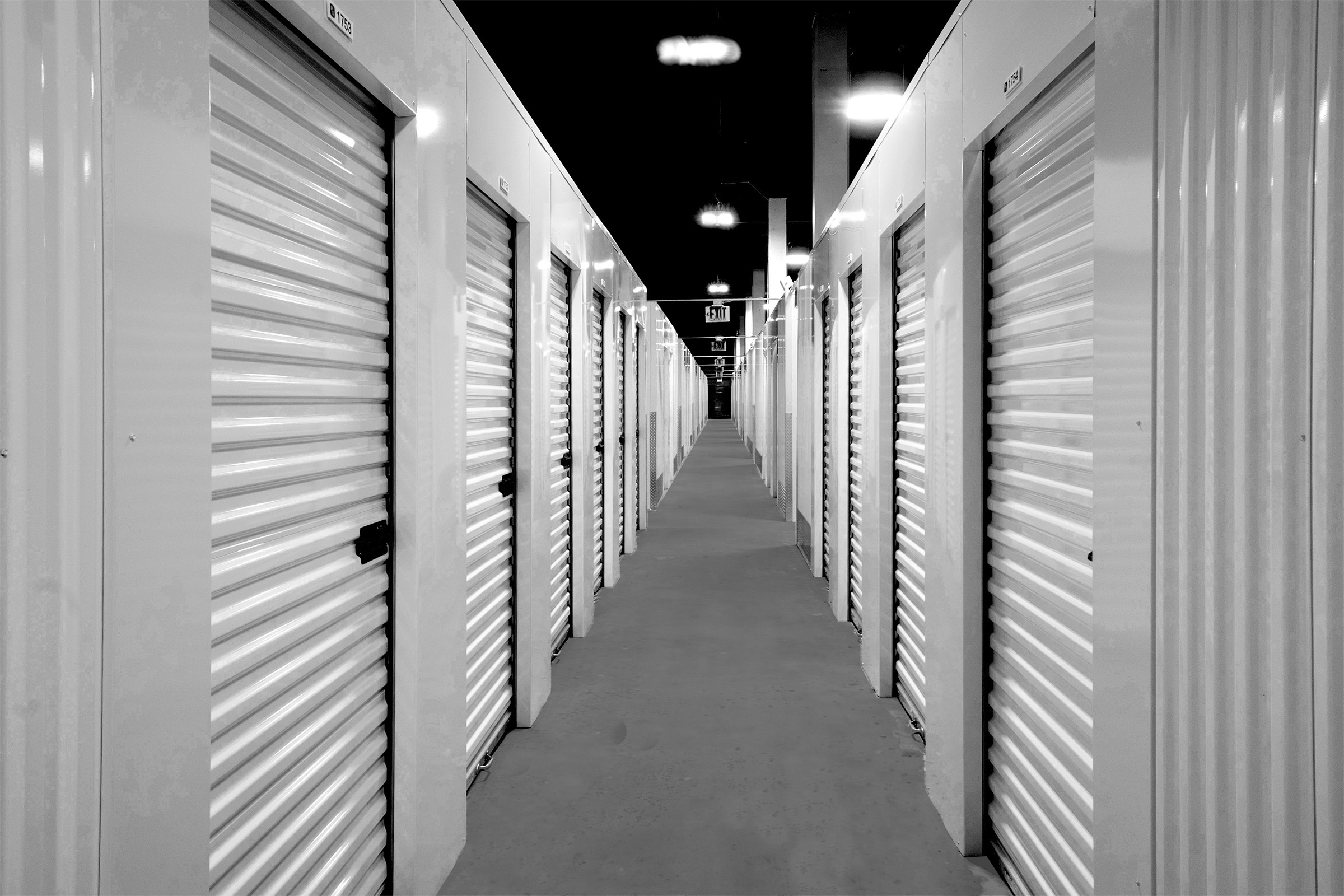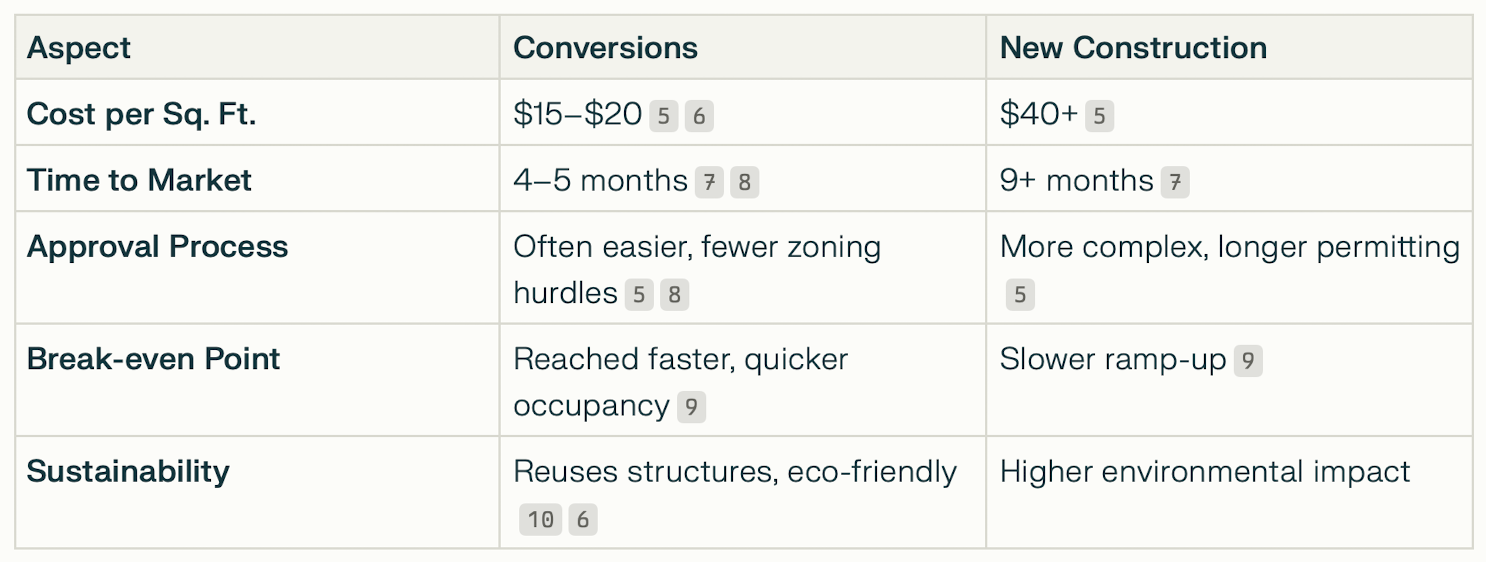

Self-Storage: A Recession-Resistant Alternative Asset for Family Offices and Small Endowments
July 9, 2025
Executive Summary
Self-storage offers recession-resistant, stable cash flow with low operating overhead and attractive conversion economics, making it an ideal diversification tool for family offices and small endowments.
Key Points:
- Demand remains steady in both expansions and downturns (e.g., downsizing, relocations), supporting solid occupancy.
- Lean staffing, month-to-month leases, and dynamic pricing support durable NOI.
- Conversions cost 37-50% less per sq ft than new builds and can be completed in around four months.
- Investment vehicles vary direct ownership, REITs, private funds, passive platforms with different control/liquidity trade-offs.
- Challenges include structural limitations, zoning/permitting, and hidden costs; thorough due diligence is essential.
Our Belief
Self-storage has emerged as a recession-resistant alternative asset, offering compelling diversification benefits for family offices and small endowments seeking to maximize returns while mitigating risk. This sector’s unique blend of consistent demand, operational efficiency, and cost-effective expansion through conversions positions it as a strategic addition to any institutional portfolio.
Why Self-Storage Is Recession-Resistant
Consistent Demand Across Economic Cycles:
Self-storage facilities maintain steady occupancy regardless of economic conditions. During periods of growth, individuals and businesses accumulate more possessions, increasing storage needs. In downturns, life changes such as downsizing, job relocations, or business consolidations drive further demand for storage space [1][2]. This demand resilience was evident during the 2008 financial crisis and the COVID-19 pandemic, when self-storage occupancy and returns remained stable while other real estate sectors faltered [2][1].
Low Operating Costs and Flexible Business Model:
Self-storage operations are lean, with minimal staffing and maintenance requirements compared to other real estate assets [1][2]. The sector’s month-to-month lease structure allows operators to adjust rental rates quickly in response to market shifts, supporting stable cash flows [3][2].
Diverse Customer Base:
Facilities serve a wide spectrum of users—from individuals to small businesses—reducing reliance on any single tenant type and further insulating the asset from sector-specific downturns [1][2].
Diversification Benefits for Family Offices and Endowments
Low Correlation with Traditional Assets:
Self-storage’s performance is largely uncorrelated with stocks, bonds, and other real estate types, enhancing portfolio diversification and reducing overall volatility [1][3][4].
Stable, Passive Income:
The sector offers reliable monthly rental income with less operational complexity than multifamily or office properties. Professional management and automation tools can further streamline operations for passive investors [4][2].
Scalability and Flexibility:
Investors can start with a single facility and expand through acquisitions or conversions, tailoring portfolio growth to strategic objectives [3][4].
Maximizing Returns: The Power of Conversions
One of the most effective ways to enhance returns in self-storage is through converting existing buildings—such as vacant retail, warehouses, or office spaces—into storage facilities. This strategy offers several advantages over ground-up development:

Key Benefits of Conversions
Cost Savings:
Conversions typically cost 37% to 50% less per square foot than new builds, thanks to existing infrastructure and utilities [10][11][6]. This reduces upfront capital requirements and increases ROI potential.
Faster Time-to-Market:
With much of the structure already in place, conversions can be completed in about four months, allowing facilities to start generating income and reach stabilization more quickly [7][8][9].
Easier Financing:
Banks often prefer conversions due to lower risk and faster project completion, leading to quicker loan approvals [7][5].
Community and Environmental Impact:
Repurposing vacant buildings revitalizes neighborhoods and reduces the environmental footprint compared to new construction [10][11][6].
Market Penetration:
Conversions allow investors to enter high-barrier markets where land for new development is scarce or expensive [10][8].

Considerations and Challenges
Structural Limitations:
Not all buildings are suitable for conversion; issues like load-bearing walls or insufficient floor capacity can add complexity and cost[10][5].
Zoning and Permitting:
While often simpler, some projects may still face regulatory hurdles, especially if significant changes to the building’s use or footprint are required[10][5].
Hidden Costs:
Unexpected repairs or hazardous materials can impact budgets, underscoring the need for thorough due diligence and feasibility studies[10][5].
Investment Vehicles for Self-Storage -- Pros/Cons
Family offices and institutional investors can access self-storage through several primary investment vehicles, each offering distinct advantages and trade-offs:
Direct Ownership
Pros: Provides maximum control over operations, customization of strategy, and potential for higher returns through active management and value-add initiatives such as conversions or operational improvements.
Cons: Requires significant operational expertise, hands-on involvement, and higher capital outlays. Investors assume all property-level risks and must manage regulatory, leasing, and maintenance complexities.
Public REITs (Real Estate Investment Trusts)
Pros: Offer liquidity, diversification across multiple markets and properties, and professional management. Publicly traded shares allow for easy entry and exit, and investors benefit from transparency and regulatory oversight.
Cons: Subject to stock market volatility and limited ability to influence asset-level decisions. Dividend yields may fluctuate with market cycles and broader real estate trends.
Private Equity Funds and Syndications
Pros: Enable access to institutional-quality assets and specialized operators, often focusing on value-add strategies like conversions or operational efficiencies. Investors can benefit from pooled resources, professional management, and potential for outsized returns. Our firm, Global Storage Partners, fits into this category.
Cons: Typically require longer investment horizons, higher minimum commitments, and may offer less liquidity than public vehicles. Due diligence is essential, as performance varies by sponsor and strategy.
Passive Investment Platforms
Pros: Provide hands-off exposure to self-storage, often with lower minimums and simplified access for accredited investors. These platforms aggregate capital to invest in multiple projects, spreading risk and reducing the need for direct management.
Cons: Investors have little to no control over asset selection or management, and returns depend on the platform’s expertise and deal flow. Liquidity may be limited and fees can reduce net returns.
Each vehicle offers a different balance of control, risk, liquidity, and return potential, allowing investors to tailor their self-storage exposure to their strategic objectives and risk tolerance.
Conclusion
Self-storage stands out as a recession-resistant, cost-effective, and scalable alternative asset—uniquely suited for family offices and small endowments seeking diversification and reliable returns. By leveraging the cost and speed advantages of conversions, investors can maximize yield, minimize risk, and respond nimbly to shifting market dynamics. As the sector continues to evolve, self-storage remains a strategic pillar for resilient portfolio construction [1][10][2].
-------------------
Sources
[1] How Self-Storage is Recession Resilient - Radius+ https://www.radiusplus.com/post/how-self-storage-is-recession-resilient/
[2] Self-Storage: The Recession-Resistant Investment You Need to ... https://www.storagepointcapital.com/post/self-storage-the-recession-resistant-investment-you-need-to-consider
[3] Navigating Self-Storage Investing - Terrydale Capital https://terrydalecapital.com/learn/self-storage-investing
[4] Why Self-Storage Is the Next Big Opportunity for High-Net-Worth ... https://signalv.com/why-self-storage-is-the-next-big-opportunity-for-high-net-worth-investors/
[5] Pros & Cons of Self Storage Conversions - Storelocal https://members.storelocal.com/blog/pros-cons-of-self-storage-conversions
[6] Pros And Cons Of Self Storage Conversions https://www.wigwamstoragemanagement.com/blogs/pros-and-cons-of-self-storage-conversions
[7] Why Self-Storage Conversions Make Sense https://selfstorage.loan/blog/why-self-storage-conversions-make-sense/
[8] [2023] Self Storage Conversions: Tips, Tricks, & Benefits - StoragePug https://www.storagepug.com/blog/2018/08/benefits-of-converting-existing-buildings-into-self-storage/
[9] How to Financially Analyze a Potential Self-Storage Conversion. https://creatingwealththroughselfstorage.com/how-to-financially-analyze-a-potential-self-storage-conversion/
[10] Maximizing Space: The Ultimate Guide to Self Storage Conversion https://www.storagebuildingcompany.com/resources/2024/10/16/maximizing-space-the-ultimate-guide-to-self-storage-conversion
[11] The Cost-Effectiveness of Conversions vs. New Construction https://www.globalstoragepartners.com/articles/the-cost-effectiveness-of-conversions-vs-new-construction
[12] The 100 Largest Self Storage Companies in the U.S. - RentCafe https://www.rentcafe.com/blog/self-storage/the-100-largest-self-storage-companies-in-the-u-s/
[13] Room To Grow: 5 Best Self-Storage Syndicators & Fund Managers https://rockstep.com/blog/best-self-storage-syndicators-fund-managers
[14] May 7 Live Self Storage Investing Masterclass with Scott Meyers https://selfstorageinvesting.com/the-masterclass-2/
[15] Why Self-Storage Can be a Reliable Alternative Asset - REI INK https://rei-ink.com/why-self-storage-can-be-a-reliable-alternative-asset/
[16] Among Alternative Investments, Self-Storage Stands Out https://www.familywealthreport.com/article.php/Among-Alternative-Investments,-Self_dash_Storage-Stands-Out
[17] The 4 Most Recession-Resistant Commercial Real Estate Asset Types https://www.excelsiorgp.com/resources/the-4-most-recession-resistant-commercial-real-estate-asset-types/
[18] Recession-Proof Self-Storage Investments in the U.S. https://storagecaves.com/self-storage-investors-recession-proof
[19] Conversions - Inside Self-Storage https://www.insideselfstorage.com/self-storage-development/conversions
[20] Out With The Old, In With Self Storage Conversions - CRE Daily https://www.credaily.com/briefs/out-with-the-old-in-with-self-storage-conversions/
[21] Self Storage Conversion Walkthrough (Pros & Cons) Part 4 - YouTube https://www.youtube.com/watch?v=d7qngXBXX20
[22] Inside Self-Storage Top Operators 2024: Facility Owners https://www.insideselfstorage.com/iss-top-operators-facility-owners
[23] Top 10 Self Storage Investment Sales Agencies Nationally by Volume https://traded.co/agencies/sale/national/self-storage/
[24] How to Expand Your Self-Storage Portfolio | IRE, LLC https://irellc.com/2022/06/expanding-self-storage-portfolio/
[25] Recession Proof Investment Top Self Storage Fund - Mainstay Global http://www.mainstayglobal.com/self-storage
[26] The Top 10 Self-Storage Companies of 2022 https://www.commercialrealestate.loans/blog/the-top-10-self-storage-companies-2022/
[27] Unpacking self storage: A sector on the move https://www.cbreim.com/insights/articles/unpacking-self-storage-a-sector-on-the-move
[28] 4 Common Methods For Investing In Self-Storage https://www.modernstoragemedia.com/msm-exclusives/4-common-methods-for-investing-in-self-storage
[29] U.S. Self Storage: Market Trends & Sector Outlook https://www.cushmanwakefield.com/en/united-states/insights/us-self-storage-market-trends-and-sector-outlook
[30] Investing In The Self Storage Market For Beginners - Radius Plus https://www.radiusplus.com/post/investing-in-the-self-storage-market-for-beginners/



